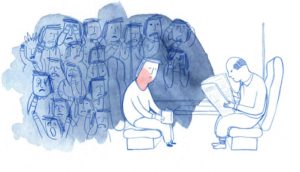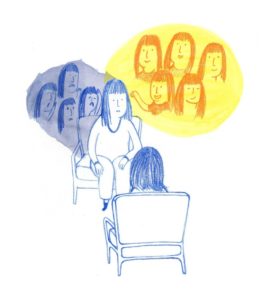
One never feels radiant with joy and contentment every waking moment; one’s dreams are not all stories of elation and beauty. For, alas, the experience of living entails a multitude of distressing emotions, some of which are generated by our body’s chemistry, while others are kindled by the discordant rhythms of the everyday; and many are struck alight by traumatic events. Some unpleasant moods are quick to pass; others make us feel as if our hearts are being hit with a meat cleaver; immortal be the spirit of anguish.
As our priest once commented, some people find tragedy life enhancing. While one will never ‘get over’ the loss of a child from a cot death, another uses the tragedy to start a new life helping others handle the torment, for example, by establishing a charity providing comfort to others in the same realm of suffering.
One quite creative remedy is The Poetry Pharmacy. This is not a chemists’ shop. This is a book by William Sieghart
which helps people find solace in poetry. Sieghart writes “again and again in my loneliest hours and in my most tumultuous, I have discovered the greatest solace in finding, reading and sometimes memorizing the perfect poem for the moment” .
For emphasis , Sieghart quotes Alan Bennett . ” ‘The best moments in reading are when you come across something – a thought, a feeling, a wa y of looking at things – which you had thought special and particular to you. Now here it is, set down by someone else, a person you have never met , someone even who is long dead . And it is as if a hand has come out and taken yours'”. The poet, suggests Sieghart, because of his poignant verse, is someone who “understands , and what results is a sort of peace “.
Sieghart hopes that readers will find a poem within the book that helps them overcome their negative feelings . Each poem is a prescription, hence the sub title: Tried and True Prescriptions for the Heart, Mind and Soul. There are five major ‘themed’ sections in the book. Each addresses a host of “conditions”, the poetic prescriptions being “also suitable for ” similar conditions. Some examples will help you see how this all makes sense and is not just a confusing 1000 piece jigsaw puzzle .
The first major section is “Mental and Emotional Wellbeing”. For the condition emotional baggage , Sieghart offers a poem by Jane Hirshfield called “Burlap Sack “. It begins: A person is full of sorrow / the way a burlap sack is full of stones or sand ./ We say , ‘Hand me the sack ,’/ but we get the weight. / This poem is also suitable for psychological scarring , trauma and trust issues . Jane Hirshfield is a widely acclaimed American poet, essayist and translator whose work has been inspired by a rich range of influences such as Greek and Roman lyrics, the English sonnet and classical Chinese and Japanese poets.
The second major section is called “Motivations “. For the condition defeatism, Sieghart prescribes”Thinking ” by the obscure 20th century poet Walter D Wintle . It begins: If you think you are beaten, you are; if you think you dare not, you don ‘t./ and ends Life ‘s battles don’t always go/ To the stronger or faster man;/ But soon or late the man who wins,/is the one who thinks he can. This poem is also relevant for apathy, discouragement, pessimism, lack of self-belief and low self-esteem. It is certainly multi-purpose.
For the need for moral guidance , which also reflects ambitiousness , arrogance , failure, lack of self-belief and lack of sense of self, Sieghart serves up “If” by Rudyard Kipling . He informs us that it is Britain’s favourite poem “by any metric “. It is the poem people ask to
hear again and again. Kipling, Sieghart considers , encourages us to hold true to who we are , even in the face of corrupting influences.
 The next section , “Self-Image and Self- Acceptance “, focuses , among other conditions , on self-recrimination, which can also reflect alienation, loneliness, regret and self-loathing. Sieghart advises “Wild Geese “, by the American poet Mary Oliver. It begins : You do not have to be good./ You do not have to walk on your knees/for a hundred miles through the desert , repenting ./ You only have to let the soft animal of your body / …love what it loves./
The next section , “Self-Image and Self- Acceptance “, focuses , among other conditions , on self-recrimination, which can also reflect alienation, loneliness, regret and self-loathing. Sieghart advises “Wild Geese “, by the American poet Mary Oliver. It begins : You do not have to be good./ You do not have to walk on your knees/for a hundred miles through the desert , repenting ./ You only have to let the soft animal of your body / …love what it loves./
For the fourth major section “The World and Other People “, for the condition fear of the other, which may involve lack of empathy, individualism and isolation, Sieghart turns to John Donne ‘s passage , now shared as verse, “No man is an island “. He believes it bursts “with relevance for modern life .. .As the Western world struggles to deal with a volume of refugees unprecedented since the Second World War, it seems that our supplies of empathy and fellow feeling are increasingly falling short of demand “.
For the final section “Love and Loss “, for bereavement – and possibly extreme grief and mourning – Sieghart brings one to tears with Mary Elizabeth Frye’s “Do Not Stand by My Grave and Weep “. Do not stand at my grave and weep, / I am not there , l do not sleep. / it starts. At the end we recite: Do not stand at a my grave and cry,/I am not there, I did not die. Frye was also a florist when she was not writing poetry!
Sieghart’s life is a rich tapestry of poetic endeavours, many philanthropic. His father, Paul, was a human rights lawyer, his mother, Felicity, was a chair of the National Association for Gifted Children (now Potential Plus) and a magistrate. Sieghart founded Forward Publishing when he was 26. He established StreetSmart in 1998, an enterprise wherefore in the festive months of November and December diners give a percentage of their bill at participating restaurants to the homeless. Sieghart also founded National Poetry Day.
When Sieghart was being interviewed at a literary festival about an anthology he had published, a friend encouraged him to prescribe poems to audience members after the talk. People stood for several hours waiting for Sieghart to prescribe a poem for them, while he sat in a tent with a prescription pad and an extra armchair. The seeds of the Poetry Pharmacy were thus planted and well-nourished later on the BBC, in The Guardian and libraries throughout the land. Over a thousand people have received Sieghart’s prescriptions.
“There is nothing like listening to people’s problems in leafy Kensington and then a council estate in Liverpool for making you realise the basic spiritual sameness that runs throughout humanity,” Sieghart writes. Sieghart has given me faith in poetry‘s power to touch and replenish our souls, transform our lives. I keep his book on my bedside table. Don’t let cynicism (see page 8!) get the better of you. Put your faith in Sieghart’s prescriptions.
Notes:
The Poetry Pharmacy by William Sieghart, published by Penguin Books, 2017. A second volume has recently been published: The Poetry Pharmacy Returns. More prescriptions for Courage, Healing and Hope.
Second image:”Counselling for social anxiety disorder”, illustration. Jasmine Parker. CC BY-NC. Courtesy of the Wellcome Collection. The first image is also by Jasmine Parker, courtesy of the Wellcome Collection.
